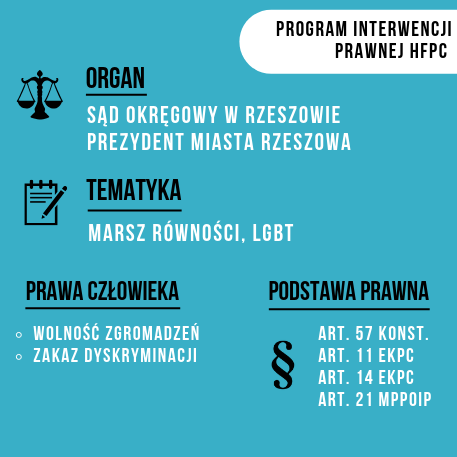
HFHR on prohibition of Rzeszów Equality March
♦ On 5 June, the Mayor of Rzeszów banned the holding of the local Equality March.
♦ The organizer of the March challenged the Mayor’s decision by appealing to the Regional Court in Rzeszów.
♦ The Helsinki Foundation for Human Rights submitted an amicus curiae brief in this case.
♦ On 8 June, the Regional Court in Rzeszów accepted the appeals and revoked the Mayor’ decision.
On 23 May 2019, the Municipal Office of Rzeszów received a notice of a public assembly (the Equality March) scheduled for 22 June 2019. However, by a decision of 5 June this year, the Mayor banned the holding of the assembly, invoking concerns about a threat to human life or health and the risk of considerable damage to property. The organizer appealed against the Mayor’s decision before the Regional Court in Rzeszów.
HFHR intervenes and submits amicus curiae brief
In the amicus curiae brief, the HFHR highlighted the constitutional and international standards of freedom of assembly, relevant policing and safety standards, as well as the discriminatory nature of the ban on the assembly concerned.
As the Foundation argued in the brief, while the Mayor justified his decision by referring to objective reasons, which purportedly necessitated the banning of the assembly, the ban has actually led to at least indirect discrimination on grounds of sexual orientation.
“Since the freedom of assembly is protected by the Constitution and international law, any restriction of this freedom should be an absolute exception, assessed in the light of the principle of proportionality”, points out HFHR’s lawyer Justyna Jezierska. “Freedom of assembly guarantees that citizens can effectively participate in social and political life. It is necessary to enable individuals to express their views and influence the public sphere”, she added.
Piotr Kubaszewski, leader of the HFHR Legal Intervention Programme, recalls that in Bączkowski and Others v. Poland, the European Court of Human Rights found that there had been a violation of the prohibition of discrimination in the exercise of the freedom of assembly as laid down in Articles 11 and 14 of the Convention. The Bączkowski case concerned the Mayor of Warsaw’s ban on the Equality Parade, which was to take place in Warsaw in June 2005. “The decision banning the assembly in Warsaw was also justified by circumstances relating to security considerations, so an analogy can be drawn with the present case”, Mr Kubaszewski adds.
The ban on the Rzeszów march is another case related to the freedom of assembly in which the HFHR intervenes. In April 2019, we presented an amicus curiae brief on the prohibition of the Equality March in Gniezno. In November 2018, we prepared another brief on the Independence March in Warsaw, and in October 2018 the HFHR intervened in the case of the holding of the Equality March in Lublin.


11.06.2019
 Cookies EN
Cookies EN